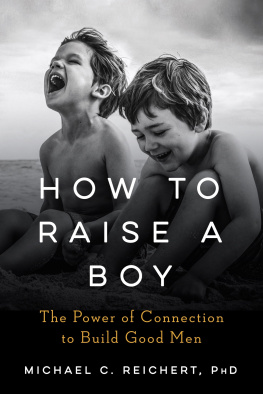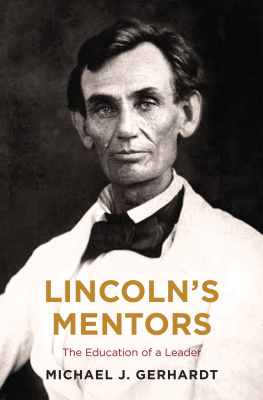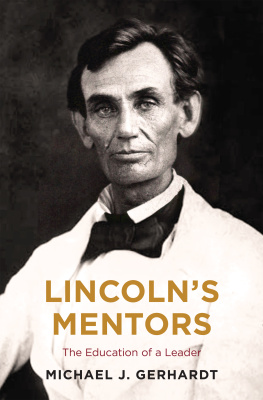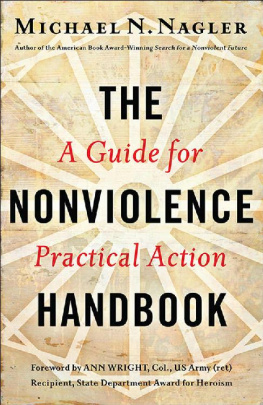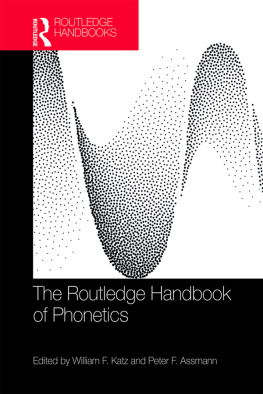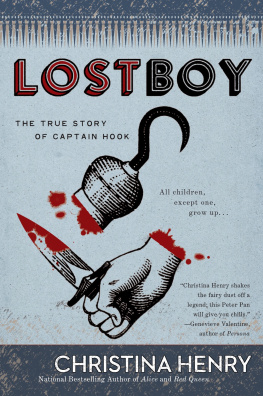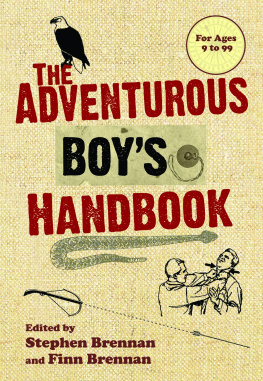Fr. Peter Michael Henry - The Mentors Handbook: How to Form Boys Into Inspiring and Capable Men
Here you can read online Fr. Peter Michael Henry - The Mentors Handbook: How to Form Boys Into Inspiring and Capable Men full text of the book (entire story) in english for free. Download pdf and epub, get meaning, cover and reviews about this ebook. year: 2018, publisher: Sophia Institute Press, genre: Science. Description of the work, (preface) as well as reviews are available. Best literature library LitArk.com created for fans of good reading and offers a wide selection of genres:
Romance novel
Science fiction
Adventure
Detective
Science
History
Home and family
Prose
Art
Politics
Computer
Non-fiction
Religion
Business
Children
Humor
Choose a favorite category and find really read worthwhile books. Enjoy immersion in the world of imagination, feel the emotions of the characters or learn something new for yourself, make an fascinating discovery.

- Book:The Mentors Handbook: How to Form Boys Into Inspiring and Capable Men
- Author:
- Publisher:Sophia Institute Press
- Genre:
- Year:2018
- Rating:4 / 5
- Favourites:Add to favourites
- Your mark:
- 80
- 1
- 2
- 3
- 4
- 5
The Mentors Handbook: How to Form Boys Into Inspiring and Capable Men: summary, description and annotation
We offer to read an annotation, description, summary or preface (depends on what the author of the book "The Mentors Handbook: How to Form Boys Into Inspiring and Capable Men" wrote himself). If you haven't found the necessary information about the book — write in the comments, we will try to find it.
The Mentors Handbook: How to Form Boys Into Inspiring and Capable Men — read online for free the complete book (whole text) full work
Below is the text of the book, divided by pages. System saving the place of the last page read, allows you to conveniently read the book "The Mentors Handbook: How to Form Boys Into Inspiring and Capable Men" online for free, without having to search again every time where you left off. Put a bookmark, and you can go to the page where you finished reading at any time.
Font size:
Interval:
Bookmark:
Fr. Peter M. Henry
The
Mentors
Handbook
How to Form Boys into
Inspiring and Capable Men
Edited by Nathan St. John
Foreword by Anthony Esolen
SOPHIA INSTITUTE PRESS
Manchester, New Hampshire
Copyright 2018 by Peter M. Henry
Printed in the United States of America. All rights reserved.
Cover design by Perceptions Design Studio.
Cover photo by Matheus Ferrero on Unsplash.com.
Biblical references in this book are taken from the Catholic Edition of the Revised Standard Version of the Bible, copyright 1965, 1966 by the Division of Christian Education of the National Council of the Churches of Christ in the United States of America. Used by permission. All rights reserved.
Excerpts from the Catechism of the Catholic Church , second edition, 2000 by Libreria Editrice VaticanaUnited States Conference of Catholic Bishops, Washington, D.C. All rights reserved. Used with permission.
No part of this book may be reproduced, stored in a retrieval system, or transmitted in any form, or by any means, electronic, mechanical, photocopying, or otherwise, without the prior written permission of the publisher, except by a reviewer, who may quote brief passages in a review.
Sophia Institute Press
Box 5284, Manchester, NH 03108
1-800-888-9344
www.SophiaInstitute.com
Sophia Institute Press is a registered trademark of Sophia Institute.
Library of Congress Cataloging-in-Publication Data
Names: Henry, Peter M., author.
Title: The mentors handbook : how to form boys into inspiring and capable
men / Peter M. Henry ; foreword by Anthony Esolen.
Description: Manchester, New Hampshire : Sophia Institute Press, 2018. |
Includes bibliographical references.
Identifiers: LCCN 2018028062 | ISBN 9781622826346 (pbk. : alk. paper) ePub ISBN 9781622826353
Subjects: LCSH: Boys Religious life. | Boys Conduct of life. | Church work
with children. | Church work Catholic Church. | Mentoring Religious
aspects Christianity.
Classification: LCC BX2347.8.B7 H46 2018 | DDC 259/.22 dc23 LC record available at https://lccn.loc.gov/2018028062
To all those who have entrusted themselves to me:
may we all know the Fatherhood of God.
Contents
by Anthony Esolen
Part 1
Part 2
Part 3
Part 4
Conclusion:
Appendix:
Foreword
Peter M. Henry has written the book I wish I had written, or I wish I could have written, but I concede pride of place to the master of the art. It is an old art, as old as mankind, and it is, culturally, the most dynamic art that man has ever known: it gets things done. It clears fields, builds houses, digs canals, secures food, lays down roads and highways, and flings electric wires across a continent. It goes down to the sea in ships, and down into a darker place than that, the bowels of the earth, to bring back coal and iron, copper and tin, silver and gold. It builds up the city and defends it against the wicked. The art is to turn boys into men into a brotherhood of men united for the common good.
I hope it requires no argument to declare that boys in our time are in a bad way. They fail in school, and when they act out their frustrations, they are given psychotropic drugs, when, most of the time, hard physical work, fresh air, boyish interests, and men to teach them would clear up the problem right away. This is the sort of thing that Fr. Henry shows in his book. A boy can go to school for years and never hear, not even once, that his sex is responsible for anything other than crime, oppression, and stupidity; and nothing like that, nothing close, has ever been visited on his sisters in American public schools or Christian schools, even when it was taken for granted as a matter of social good that most girls would get married soon after high school and become homemakers with a brood of happy children. If men have succeeded remarkably at a thing let us say, chess or epic poetry or building cathedrals or inventing machines or painting the Sistine Chapel ceiling the boys are told that it was only because women were not permitted to do it. So all the great achievements that might move their souls are filmed over with ingratitude, if not outright slander.
Men can shrug such insults off, but boys are boys, not men, and should not have to endure it. Quite the contrary: they should be given lands to seek and realms to conquer, and if their women teachers cannot do that, or will not do it, then the education of boys must be resumed by men. That is for the sake of the boys, for the culture that will depend on their dynamism, for the women they will marry and the children they will raise. We should not fool ourselves into believing that the male sex will suddenly become utterly tame and inoffensive and compliant, when their very bodies cry out for action. There is nothing we can do about that, if not to work with nature and not against it. We understand the principle with big and energetic canines. It is only boys in our time whom, as the saying goes, we treat like dogs.
And so Fr. Henry has written an instruction manual whose every sentence speaks solid, strong, clear advice on how to make boys into men. He is a plain dealer. Boys long for the challenge, physical or spiritual or intellectual. Fr. Henry shows how to give that to them. Boys admire men who speak the truth to them and do not spare their feelings. Fr. Henry shows us how to speak the truth, not with softness, but with straight shooting and manly kindness. Boys cannot go it alone, nor have they ever done so, not in the history of the race. And so the author most wisely brings to the center of our attention what a friend of mine has called the forgotten icon, the brotherhood, whose noblest and holiest embodiment is the band of Christs apostles. Most moving are Fr. Henrys descriptions of what boys become for one another when a trusted man leads them and brings them out of their selfish and silly puerility. He tells a story of how one boy in his group, on a camping trip, smuggled some whiskey into the camp. Fr. Henry knew of it but did not budge from his tent. It was the boys themselves who talked turkey to their fellow, reminding him that they were on their honor a word we hear very little about these days and that Fr. Henry trusted them, and they should not betray that trust. The author recalls the silence then, and the gentle trickle of whiskey being poured out on the ground.
What about discipline? I am reminded of C. S. Lewiss shrewd observation in The Abolition of Man , that we remove the organ and demand the function. We castrate, and bid the gelding be fruitful, he says. We raise up men without chests, and then we are surprised to find that there is no honor, no spirit in the spiritual weaklings we have raised. So we now raise boys without discipline, and then we punish them for doing whatever they feel like doing. If one boy out of a class of thirty is unruly, that is his problem, though we must address it. If boys generally are unruly, then we may assume that there is no discipline at all that is our problem. But what rewards do we reap from that discipline! We have forgotten those rewards. They are still there to be reaped, if we would but reject the lie that boys naturally and effortlessly, and without strong, clear-minded leadership from men, simply grow into their masculine nature. As Fr. Henry rightly observes:
Men... are not born, but made. We can no longer leave boys to themselves and expect them to be the type of men who are happy and fulfilled and ready to make worthy and significant contributions to our families, our country, and our church.... Boys need to be patiently and methodically taught, nurtured and, most especially, mentored.
Now, such a statement, in the recent past, would have struck no one as controversial, neither liberal nor conservative, neither religious nor secular. It would have seemed a matter of course to the modern professor in his office just as it would to the Indian elder out on the plains. And men would readily understand the kind of mentorship needed. My father, riding from client to client in a sparsely populated region of Pennsylvania, taught my brother how to sell insurance taught him the ropes, to use the metaphor from that masculine enterprise called sailing. He told him never to talk down the insurance that a prospective customer already had. He told him, in fact, never to bother to compare what he was selling with what a customer had already. The thing to do was to sell the policy because he believed that it was a good one and would benefit the people who bought it. He taught him how to make people eager to take his advice , because he showed people that he was thinking about their specific needs and was not simply out to pocket a commission. Of course, my father also taught my brother his ways, his humor, his knack for putting people at ease. My brother, I am proud to say, is one of the most successful salesmen in his company a national company.
Next pageFont size:
Interval:
Bookmark:
Similar books «The Mentors Handbook: How to Form Boys Into Inspiring and Capable Men»
Look at similar books to The Mentors Handbook: How to Form Boys Into Inspiring and Capable Men. We have selected literature similar in name and meaning in the hope of providing readers with more options to find new, interesting, not yet read works.
Discussion, reviews of the book The Mentors Handbook: How to Form Boys Into Inspiring and Capable Men and just readers' own opinions. Leave your comments, write what you think about the work, its meaning or the main characters. Specify what exactly you liked and what you didn't like, and why you think so.

